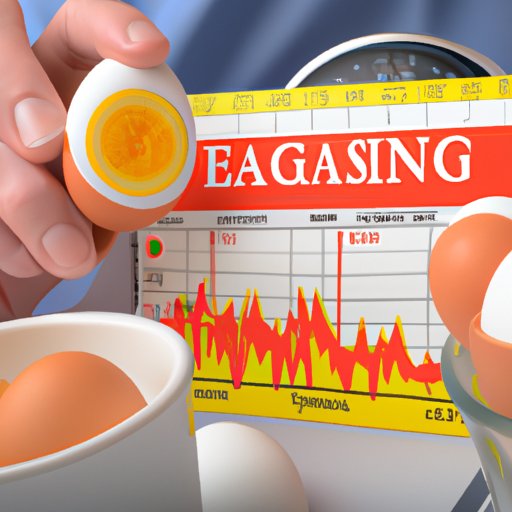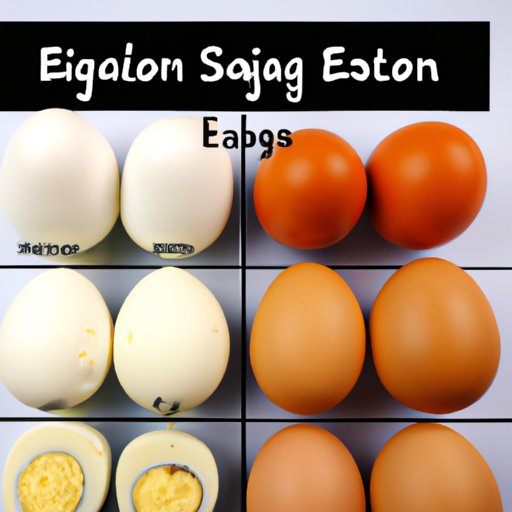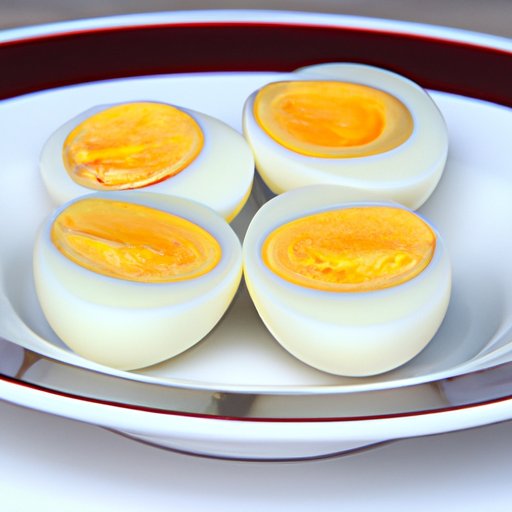Introduction
Hard boiled eggs are one of the most popular and versatile foods around. They’re packed with nutrients, relatively inexpensive, and easy to prepare. But is a hard boiled egg healthy? In this article, we’ll explore the nutritional benefits and potential health risks associated with eating hard boiled eggs.

Analyzing the Nutritional Benefits of Hard Boiled Eggs
Hard boiled eggs are an excellent source of several essential vitamins and minerals. A single large egg contains 77 calories, 6 grams of protein, 5 grams of fat, and 1 gram of carbohydrates. It also provides more than 10% of the recommended daily amounts (RDA) of vitamin A, vitamin B12, selenium, and phosphorus.
Eggs are also a good source of choline, which is an important nutrient for brain development and memory. Eggs contain all nine essential amino acids, making them a complete protein source. The yolks are especially rich in healthy fats, including omega-3 fatty acids.
Exploring the Health Risks of Eating Hard Boiled Eggs
There are some potential health risks associated with eating hard boiled eggs. The most common concern is the cholesterol content. Each large egg contains 186 milligrams of cholesterol, which is more than half of the daily recommended amount. High cholesterol levels can increase your risk of heart disease and stroke.
The way you cook your eggs can also have an effect on their nutritional value. High-heat cooking methods like boiling or frying can cause the formation of harmful compounds called advanced glycation end products (AGEs). These compounds can damage cells and trigger inflammation in the body.
Finally, some people may be allergic to eggs. Symptoms of an egg allergy can range from mild skin reactions to severe anaphylactic shock. If you experience any of these symptoms after eating eggs, it’s important to seek medical attention.

Examining the Impact of Hard Boiled Eggs on Cholesterol Levels
It’s important to remember that dietary cholesterol does not necessarily raise blood cholesterol levels. In fact, research suggests that eating up to three whole eggs per day is unlikely to increase your risk of heart disease. To reduce your risk of high cholesterol, it’s important to limit your intake of saturated and trans fats.
If you’re concerned about your cholesterol levels, there are a few simple steps you can take. Try to eat fewer processed foods and opt for leaner cuts of meat. Also, be sure to incorporate plenty of fruits and vegetables into your diet, as they are rich in fiber and antioxidants.

Comparing Hard Boiled Eggs to Other Types of Protein Sources
When it comes to protein, hard boiled eggs are a great source. One large egg contains 6 grams of protein, which is about 12% of the RDA for men and 15% for women. However, it’s important to note that the quality of protein in eggs is lower than that of animal-based proteins such as beef, poultry, and fish.
If you’re looking for a higher-quality source of protein, consider incorporating legumes, nuts, seeds, and dairy into your diet. These foods are also good sources of fiber, vitamins, and minerals.
Investigating the Role of Hard Boiled Eggs in Weight Loss Diets
Hard boiled eggs can be a helpful addition to a weight loss diet. They are low in calories and contain a good amount of protein, which can help you feel full for longer. A single large egg contains 77 calories, 5 grams of fat, and 6 grams of protein.
In addition, eggs are a good source of micronutrients such as vitamin A, vitamin B12, selenium, and phosphorus. These nutrients can help support overall health and wellness while you’re trying to lose weight.
Conclusion
In conclusion, hard boiled eggs can be a nutritious addition to your diet. They provide a good amount of protein and essential vitamins and minerals. However, it’s important to keep in mind that eggs are high in cholesterol and should be consumed in moderation. Additionally, high-heat cooking methods can create harmful compounds. To reduce your risk of high cholesterol and ensure you’re getting the most nutrients out of your eggs, opt for lower-heat cooking methods such as poaching or steaming.
Overall, hard boiled eggs can be a healthy part of your diet. Just be sure to watch your portion sizes and limit your intake of saturated and trans fats. With these tips, you can enjoy the nutritional benefits of hard boiled eggs without compromising your health.
(Note: Is this article not meeting your expectations? Do you have knowledge or insights to share? Unlock new opportunities and expand your reach by joining our authors team. Click Registration to join us and share your expertise with our readers.)
